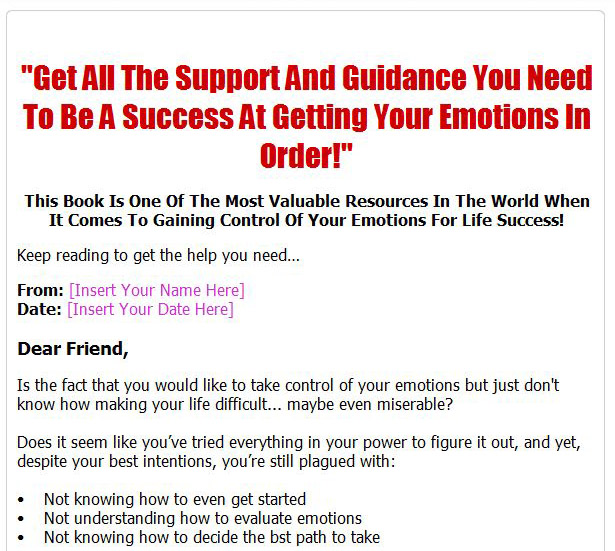Salespage Snapshot:

>>> Click Here To View Full Sales Page…
Table of Contents
Foreword
Chapter 1:
Emotion Basics
Chapter 2:
Evaluate Your Emotions
Chapter 3:
Understand Where Your Emotions Come From
Chapter 4:
Note Your Surroundings And Circumstances
Chapter 5:
Brainstorm Other Responses
Chapter 6:
Evaluate Your Options
Chapter 7:
Decide The Best Route To Take
Chapter 8:
Learn To Be Happy With Yourself
Sample Content Preview
Chapter 2
Evaluate Your Emotions
Synopsis
There are times when you find it hard to identify what you really feel. You do not know if you are irritated or angry or something much worse than that. People’s emotions can become too confusing at times and for this reason, it is a must that you learn to evaluate your emotions, which is exactly what will be discussed in this chapter.
Ways on Getting Your Emotions Evaluated
You feel messed up and instead of doing something to figure out the reason behind this, you just resort to telling yourself that life is really unfair and you are a terrible person. However, not being able to distinguish between your negative emotions and letting them lump together to form into a miserable mess can actually lead to great deals of emotional stress based on the latest study.
Experts state that those who find it difficult to distinguish one emotion from another usually have a sense of unpleasantness in general. If you cannot differentiate your emotions, you will find it harder to act in the appropriate way.
For you to get to the bottom of what you are truly feeling, there are several things that you can try to get your emotional knots completely untangled.
Give yourself some time out. Every day, try to allot some time for decompression. Take note that you have no capacity of reacting properly to a certain situation when you still carry the emotions of the earlier time in your day.
You can try training your emotional brain. Not all people have the ability of identifying their emotions that are more nuanced but you can at least try honing your skills by starting with what you can. Try identifying your emotions beyond what is unpleasant. Is it guilt? Anger? Or shame? Simply asking these questions can already help you in pinpointing your angst.
Write things down. When you find it hard to identify your various emotions, try to jot down your feelings. Patterns will start to form that can help you in differentiating one emotion to another.
Check your gut. Are you reacting to a physical sensation or to an emotion? When doubtful, rule out the physical causes of your feelings such as hunger and lack of sleep.
Take a stroll. You probably think that your busy day is over once you walk out the door but if you still have a racing pulse, chances are your emotional state is still controlled by your physiology. Taking a walk is the best choice when it comes to emotional regulation. This directs your attention inward, helping you to refocus.
Clean up your clutter. Having a clean and tidy space will be able to help you focusing your thoughts where they are required to be. Mental or physical clutter can both add to your overall sense of disarray. If you find it hard to focus, the mere act of cleaning and its result will be able to help in clearing your mind.
Chapter 3
Understand Where Your Emotions Come From
Synopsis
Do you know where your emotions are coming from? In the same way that you cannot understand why a certain person acts like that when you do not know his or her background, you will also not be able to comprehend your emotions when you do not know where they come from in the first place. By understanding where your emotions are coming, emotional balance can become more possible.
There are some people who assume that your emotions are stemming from your thoughts. But the truth is, this is completely wrong as there is a little bit more involved than your thoughts alone. Your emotions are not only about what you think about or how you put your attention to them. In contrast to some of the present self help philosophy, a person’s emotions do not only come from his or her thoughts alone.
Discover the True Source of Your Emotions
Did you ever experience listening to a comedian who tells his tragic story while adding a sense of fun to it? Comedians have this skill of discussing their relationship breakups, the collapse of the economy or even war in such a way that makes you laugh about it. These people make you think of tragedies and laugh with true joyful emotions regarding them. Obviously, there is something more than the subject matter or thoughts to create emotions. In a way, something in your point of view can affect the emotions that you create.
On the other hand, in some other moments that you think about a breakup, an economic challenge or war, it is no longer funny. You quickly feel anger, sadness, despair and injustice. If you believe that it is only your thoughts or what you put your attention on is what creates emotions, then you have accepted a plain answer and give up on the real truth.
Among the truths that people overlook is that you are the one that creates your emotions. This is overlooked because there are instances when they say things like “That is frightening” or “She is the reason for my happiness.” These things sound as if other people or situations created your emotions, without a mention of yourself being the one responsible for a certain aspect of this process. Believing such thoughts or comments can make you overlook your role in creating your emotions.
Another thing that can affect your emotions is your point of view that you use when observing a thought. Comedians have the humorous perspective regarding tragic events that can make you laugh when you look at it from their viewpoint. Politicians discuss a similar situation using a viewpoint invoking a feeling or righteousness or patriotism. Meanwhile, the point of view of the victim looking at the similar situation will cause him or her to feel sad. The point of view you use for perceiving events or from where your thoughts come from can affect the emotions that you create.
It is not only what you are thinking about but more about the viewpoint you think about this from that leaves an impact. Depending on the viewpoint that you have, you can come up with different interpretations thus making you believe various assumptions. Beliefs are then formed when you believed in these assumptions and interpretations or these activate your existing beliefs which can also have an effect on the emotions that you make as well as the level of their strength.
Your emotions are a powerful energy form or power and this comes from faith, a kind of personal power that can turn your thought to a belief. Thoughts have no power but beliefs have the power of the faith that you have.
Thoughts are not enough for creating emotions. There are some thoughts that pass through your mind and there are instances when you find these thoughts funny. Later on, when you try to look at things from a different viewpoint, you feel different regarding an exactly same thing. Your most embarrassing moment when you were in high school might have been the worst nightmare of your life that week. But with a bigger perspective of time, say, 30 years after, it will just become nothing but a mere source of genuine laughter. Even after 30 years, the history of that event is still the same but over time, your perspective has already changed and together with this, your emotions also change.
The quality of your emotion in terms of pain or pleasure that you make will largely depend on how you look at things or your point of view. The emotions’ intensity that you create during that moment will depend on the amount of fait that you invested in the assumptions and beliefs that support that thought. Faith in some beliefs is the power source behind every emotion that you have. Get your faith from all the beliefs that surround a thought and you will surely be able to alter the emotions that you feel.
The emotions that stem from your thoughts are the product of your point of view, your underlying beliefs and the amount of power that you put in them in the form of faith. In case you are trying to alter your emotional state through altering just your thoughts, you will never be able to succeed. Attempting to alter your emotions without changing your viewpoint, faith investment and underlying assumptions will probably fail. It will be like building a chair with a single leg and expecting this to give you the support that you need.
If you want to change your emotional reactions, emotional state and put more happiness into your life, it is a must that you change your point of view and recover your faith from the false beliefs that you have.
Other Details- 1 Ebook (DOCX, PDF), 28 Pages
- 1 Salespage (HTML)
- Ecover (JPG)
- File Size: 49,829 KB












